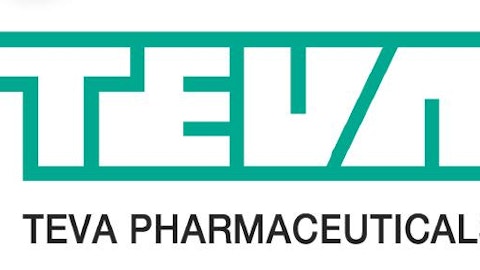All of these companies far surpass our 10% threshold, with Amgen, Inc. (NASDAQ:AMGN) offering more than three times our desired 10%. However, Amgen has seen its margins fluctuate significantly over the past five years, with current margins more than nine percentage points lower than they were three years ago. Biogen is close behind Amgen, Inc. (NASDAQ:AMGN), with margins at nearly 30%. Like Amgen, Inc. (NASDAQ:AMGN), Biogen has seen some fluctuation in its margins, but its current margins are more than 6 percentage points higher than they were five years ago. Gilead is right behind Biogen, offering margins of nearly 29%. However, its current margins are the lowest they have been in the periods here. AstraZeneca’s margins are several percentage points behind the rest of the listed companies, but are still more than double our desired 10%. Also, aside from a spike in its margins 3 years ago, the fluctuation of its margins has been pretty narrow.
Amgen, Inc. (NASDAQ:AMGN) has managed to offer a wide range of products treating illnesses as diverse as arthritis, cancer, and psoriasis. It also has some promising drugs in its pipeline, and its recent acquisition of deCODE Genetics may allow it to take the lead in providing personalized medicine options based on patients’ genetic codes. However, Amgen, Inc. (NASDAQ:AMGN) has taken a hit from competition put up by Teva Pharmaceutical Industries Ltd (ADR) (NYSE:TEVA) and companies outside the U.S. that have developed biosimilar drugs that compete with some of Amgen’s offerings, including its Neulasta/Neupogen treatment system, which battles the side-effects of chemotherapy.
Biogen got some good news last week when the EU’s drug regulatory agency recommended approval of its MS treatment drug Tecfidera. Also, Biogen expects an approval decision for the drug from the FDA later this week.
Gilead Sciences’ acquisition of Pharmasset last year poised the company to dominate the market for hepatitis C treatments after Bristol Myers Squibb Co. (NYSE:BMY) and Idenix Pharmaceuticals faced major setbacks from introducing their own hep-C drugs into the market.
AstraZeneca has suffered from the loss of its patent on Seroquel, which treats schizophrenia. In addition, the company lacks a strong pipeline of drugs that could offer hope of replacing the revenue lost due to its expired patent on Seroquel, and the upcoming loss of revenue that will likely occur when the patents expire on its Nexium and Crestor drugs.
The cash king margin can help you find highly profitable businesses, but it should only be the start of your search. The ratio does have its limits, especially for fast-growing small businesses. Many such companies reinvest all of their cash flow into growing the business, leaving them little or no free cash — but that doesn’t necessarily make them poor investments. Conversely, the formula works better for slower-growing blue chips. You’ll need to look closer to determine exactly how a company is using its cash.
Still, if you can cut through the earnings headlines to follow the cash instead, you might be on the path toward seriously great investments.
The article Is Amgen a Cash King? originally appeared on Fool.com and is written by Jim Royal.
Jim Royal has no position in any stocks mentioned. The Motley Fool recommends Gilead Sciences.
Copyright © 1995 – 2013 The Motley Fool, LLC. All rights reserved. The Motley Fool has a disclosure policy.



